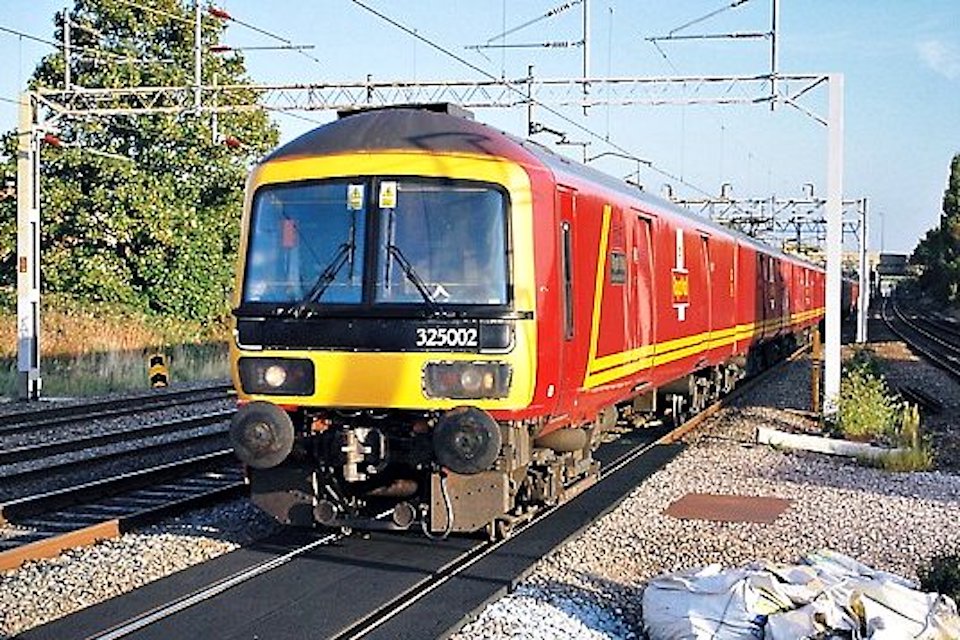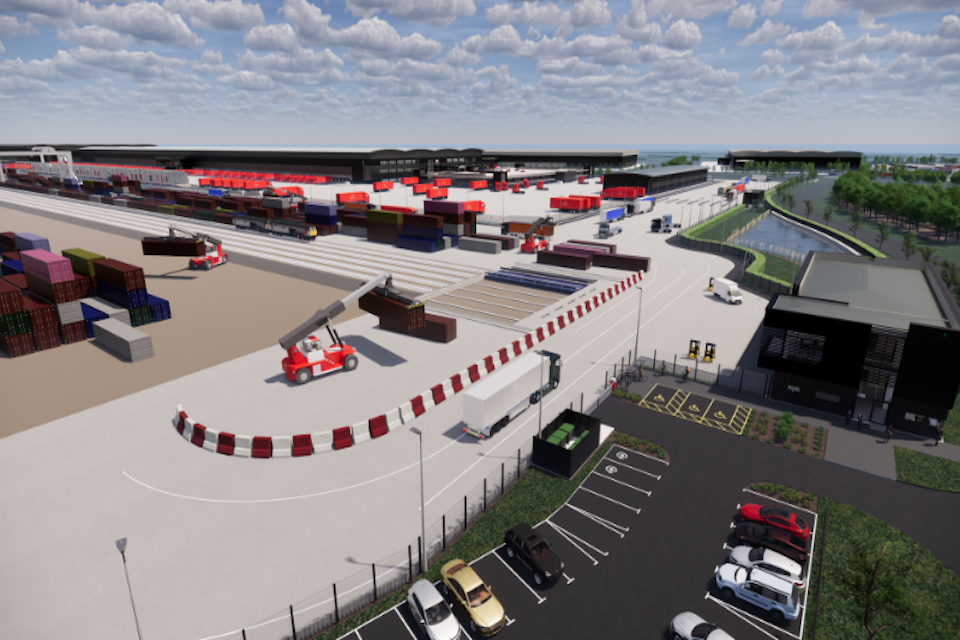UK Royal Mail withdraws from rail distribution after 200 years
There is bitter disappointment within the UK rail freight industry on the news that Royal Mail, the flagship postal carrier in the nation, is to abandon rail from its delivery proposition. The company, founded by royal decree over five centuries ago, has been an integral part of the British railway industry since 1830, only four years after the inception of the commercial railways in 1826. The privatised Royal Mail, which is in the process of a buyout by a foreign owner, has been widely reported as being in the process of selling its fleet of specially built electric multiple units (designated Class 325).
The traffic will be transferred to road transport. The decision will end the concept of the "mail train" after nearly two centuries. The move has raised eyebrows - not least because the chair of Royal Mail is Keith Williams - who was also the co-author in 2021 of the wide-ranging government report: "Great British Railways: Williams-Shapps plan for rail".
A blow for many dedicated colleagues
The dismay from the rail freight industry has been led by DB Cargo UK, the contract holder with Royal Mail as the operator of the Royal Mail rail service.
DB Cargo UK chief executive Andrea Rossi broke the news in a morning address to all staff at the rail freight operator. He has told staff that the Royal Mail decision to cease all its rail freight activities will take effect from 10 October 2024.
 Andrea Rossi, CEO of DB Cargo UK. Image: (C) DB Cargo UK
Andrea Rossi, CEO of DB Cargo UK. Image: (C) DB Cargo UK
The Royal Mail decision is incredibly disappointing not just for DB Cargo UK, but the broader rail freight sector as a whole. "This decision represents a major U-turn by Royal Mail, which had previously committed publicly that it would increase its use of rail freight to help meet its own Net Zero targets," said Rossi. "Today's decision is therefore a blow for DB Cargo UK and our many dedicated colleagues who have worked incredibly successfully over the years to meet Royal Mail's demands regarding reliability and punctuality."
Lobby Government over electricity; sparks over Williams position
The degree of that "u-turn" might be exemplified by the words of Nick Dunn, then the National Distribution Manager at Royal Mail.
In 2020, at the renewal of the contract, he spoke to DB Cargo's UK staff newsletter. "Rail is an integral part of our operation to move mail and parcels at pace so that we continue to give our customers a great service. DB Cargo has worked closely with Royal Mail to focus on the quality of our delivery service. This new contract offers an opportunity to grow and innovate together." Anyone reading that December 2020 edition of Team Red newsletter, may do so with some bitterness.
There must also be questions raised over the conflict of loyalty for Keith Williams, whose position with the Royal Mail must be called into question.
 Image: Wikimedia Commons. (C) Hugh Llewelyn
Image: Wikimedia Commons. (C) Hugh Llewelyn
It's not long ago that Royal Mail was celebrating the vast expansion of its rail-based service. A strong statement from the rail operator did not pull any punches. "DB Cargo UK, the UK's largest rail freight operator, will now be seeking urgent talks with the new Labour Government, policymakers and other key industry stakeholders, to see what more can be done to level the playing field between rail freight and the heavily subsidised road haulage sector," said the statement. "For some time now we have been lobbying the Government to address the issue of high EC4T charges (the price paid for running services on the electrified rail network) which are beyond the price many of our customers can afford to pay."
Additional 10,000 heavy goods vehicle movements
The decision by Royal Mail, one of the UK's highest profile companies, is a direct challenge to the rail freight sector, and industry at large, to meet the UK Government's target to boost modal shift by 75 per cent by 2050. DB Cargo UK has been contracted to operate and maintain Royal Mail's 15-strong fleet of Class 325 electric trains since 1 June 2013.
The fleet is owned by Royal Mail and maintained at DB Cargo UK's Crewe IEMD depot in the North-West. DB Cargo UK running 13 trains a week for Royal Mail. A new timetable was introduced on 16 June, which connects Shieldmuir with Princess Royal Distribution Centre, London; Warrington; and Daventry International Rail Freight Terminal. "We informed our recognised Trade Unions ASLEF (drivers) and United (Engineers) of Royal Mail's decision this morning," DB Cargo UK told RailFreight.com. "Based on current volumes, we estimate that Royal Mail's decision will lead to an additional 10,000 heavy goods vehicle movements per year on the UK's road network."
 Royal Mail only recently invested in rail connected facilities at DIRFT in Northamptonshire.
Royal Mail only recently invested in rail connected facilities at DIRFT in Northamptonshire.
Image: (C) Winvic
Possible new life in a logistics capacity
DB Cargo UK argues that its performance for Royal Mail has been consistently high throughout the term of the contract. Royal Mail has clearly stated that this decision has not been made due to any performance concerns. "To learn that Royal Mail is now planning to rely solely on road haulage to move customers' letters and parcels around the UK is not just disappointing for DB Cargo UK, but the wider rail freight sector too," said Andrea Rossi. "Royal Mail has made it clear that its decision is purely down to the increasing costs of electric traction (EC4T) and the high investment needs of its ageing 325 fleet. In fact, it has explicitly reiterated our excellent performance in operating and maintaining their services and units over the years.
So, this is not a decision against DB Cargo UK but one against the economics of rail freight as a mode of transport." This is the first real transport crisis to hit the new Transport Secretary, Louise Haigh, and her Rail Minister, Peter Hendy, the former chair of Network Rail. The Rail Minister is already a prominent advocate of express logistics by rail.
While still in his position as chair of the British infrastructure agency, he spoke at the launch of Varamis Rail in London, citing Royal Mail as an example of what might be achieved by new entrants to the sector. It has been noted that the Class 325 units are to be sold, not scrapped. There is the possibility that the units may yet find new life on the UK network, in a logistics capacity.
What that may mean for the experienced engineers at DB Cargo UK, remains to be seen.
Night Mail no longer crossing the border
DB Cargo UK is seeking urgent talks with the new Labour Government, policymakers and other key industry stakeholders, to see what more can be done to level the playing field between rail freight and the heavily subsidised road haulage sector. "For some time now we have been lobbying the Government to address the issue of high EC4T charges which are beyond the price many of our customers can afford to pay - indeed this is why we ourselves had to take the difficult decision to withdraw our Class 90s [electric locomotives repurposed from passenger operations]. The decision by Royal Mail, one of the UK's highest profile companies, shows that real change is needed now if we are to have any chance of meeting the Government's plan to boost modal shift by 75 per cent by 2050." Mail and its relationship with the railways is embedded in British culture.
The extent to which the Political activist and celebrated poet WH Auden was inspired to write "Night Mail" - an iconic part of English literature, which is still celebrated to this day. The poem was written and used in the 1936 film of the same name. [embedded content]
Not that the end of the line approaches, questions are being asked about the decision, and the implications for several national institutions. The Royal Mail has been in a critically bad financial state for several years. The collapse of letter post has been put down to email and rising postal prices.
The travelling post office - a sorting office on rails - has long been consigned to history, However, Royal Mail has seen a surge in parcels traffic[1], which was suited to rail transport between bulk distribution centres. That traffic was part of the reason for Royal Mail investing heavily in the Daventry International Rail Freight Terminal (DIRFT) in Northamptonshire and made their Shieldmuir (Glasgow) rail terminal busier than ever.
You just read one of our premium articles free of charge
Want full access? Take advantage of our exclusive offer
References
- ^ a surge in parcels traffic (www.railfreight.com)
- ^ See the offer (www.railfreight.com)